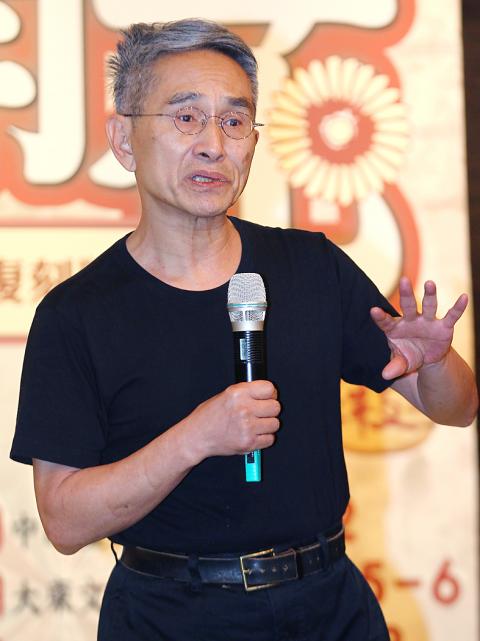Artists and actors continued an outpouring of condolences yesterday over the death of theater icon Hugh Lee (李國修), lauding him as an artist of the people and a pioneer of Taiwan’s performing arts.
Lin Hwai-min (林懷民), founder and artistic director of the Cloud Gate Dance Theatre (雲門舞集), one of the nation’s leading dance troupes, yesterday praised Lee’s plays for portraying social phenomena and reflecting the themes of family and national history.
“He is one of Taiwan’s most important ‘people’s artists,’” said Lin, who encouraged the younger generation to learn from Lee’s passion for theater.

Photo: CNA
Lee, the founder of the Ping-Fong Acting Troupe (屏風表演班), one of the nation’s most renowned drama groups, died in Greater Taichung on Tuesday at the age of 58 after battling cancer for three years.
He first rose to stardom for his comedic performances in television shows in the 1980s and won a Golden Bell Award for “actor with the most potential” in 1982.
Lee later became the first recipient of the National Award for Arts in the drama category when the award was established in 1997, in honor of his works’ blending of traditional and modern art formats and his theater group.
Lee, who stood out as a gifted director, playwright and actor, is considered one of the most prolific figures in contemporary Taiwanese theater. He wrote and directed 30 plays, and played more than 100 roles during his career.
Godot Theatre Company (果陀劇場) founder Liang Chih-min (梁志民) said that his troupe used to share a rehearsal venue with the Ping-Fong Acting Troupe, and that he and Lee would always encourage each other and honestly critique their respective works.
He described Lee as a teacher and friend who “set the best possible example for theater.”
Liu Ruo-yu (劉若瑀), artistic director of percussion troupe U-Theatre (優人神鼓) and a fan of Lee’s acting, called him “Taiwan’s Charlie Chaplin.”
Comedian Kuo Tsu-chien (郭子乾), who studied acting under Lee and knew him for more than 20 years, said that if it had not been for Lee, he would not have entered the entertainment business or become an expert impersonator.
“Your works, your contribution to theater, your influence on people and your love will always remain in our hearts,” singer and actress Rainie Yang (楊丞琳) wrote on her Sina Weibo microblog.
Ming Hwa Yuan Arts and Cultural Group (明華園戲劇總團) Director Chen Sheng-fu (陳勝福) also expressed sadness over Lee’s death and said it was “a great loss of talent.”

Alain Robert, known as the "French Spider-Man," praised Alex Honnold as exceptionally well-prepared after the US climber completed a free solo ascent of Taipei 101 yesterday. Robert said Honnold's ascent of the 508m-tall skyscraper in just more than one-and-a-half hours without using safety ropes or equipment was a remarkable achievement. "This is my life," he said in an interview conducted in French, adding that he liked the feeling of being "on the edge of danger." The 63-year-old Frenchman climbed Taipei 101 using ropes in December 2004, taking about four hours to reach the top. On a one-to-10 scale of difficulty, Robert said Taipei 101

Nipah virus infection is to be officially listed as a category 5 notifiable infectious disease in Taiwan in March, while clinical treatment guidelines are being formulated, the Centers for Disease Control (CDC) said yesterday. With Nipah infections being reported in other countries and considering its relatively high fatality rate, the centers on Jan. 16 announced that it would be listed as a notifiable infectious disease to bolster the nation’s systematic early warning system and increase public awareness, the CDC said. Bangladesh reported four fatal cases last year in separate districts, with three linked to raw date palm sap consumption, CDC Epidemic Intelligence

Two Taiwanese prosecutors were questioned by Chinese security personnel at their hotel during a trip to China’s Henan Province this month, the Mainland Affairs Council (MAC) said yesterday. The officers had personal information on the prosecutors, including “when they were assigned to their posts, their work locations and job titles,” MAC Deputy Minister and spokesman Liang Wen-chieh (梁文傑) said. On top of asking about their agencies and positions, the officers also questioned the prosecutors about the Cross-Strait Joint Crime-Fighting and Judicial Mutual Assistance Agreement, a pact that serves as the framework for Taiwan-China cooperation on combating crime and providing judicial assistance, Liang

US climber Alex Honnold left Taiwan this morning a day after completing a free-solo ascent of Taipei 101, a feat that drew cheers from onlookers and gained widespread international attention. Honnold yesterday scaled the 101-story skyscraper without a rope or safety harness. The climb — the highest urban free-solo ascent ever attempted — took just more than 90 minutes and was streamed live on Netflix. It was covered by major international news outlets including CNN, the New York Times, the Guardian and the Wall Street Journal. As Honnold prepared to leave Taiwan today, he attracted a crowd when he and his wife, Sanni,